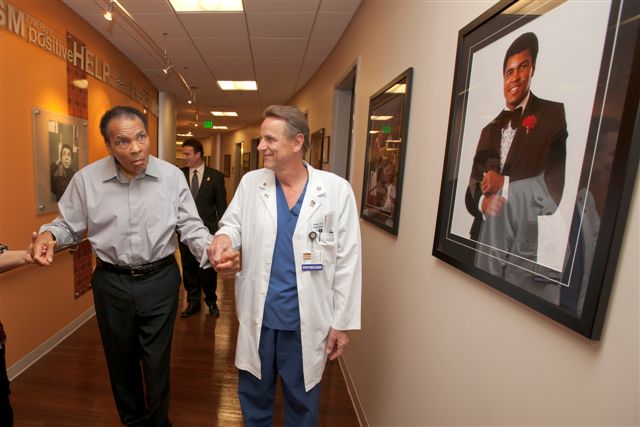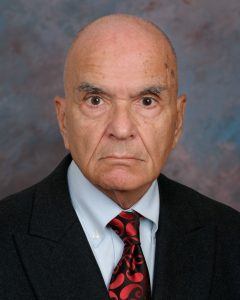
Parkinson’s Awareness Has Grown Since Muhammad Ali’s Death
On the first anniversary of Muhammad Ali’s death, nearly half of Americans say awareness of Parkinson’s disease has increased over the last year – a testament to the enduring power of Ali’s long and inspirational fight against the disease, according to a new national survey by the Muhammad Ali Parkinson Center.
And while 90 percent said they most remember Ali for his boxing career, more than 60 percent recall the dignity and grace with which he battled Parkinson’s disease over the last three decades of his remarkable life.
Ali, then 42, was diagnosed in 1984 with Parkinson’s, a chronic and progressive movement disorder that has no known cause or cure. He died of complications on June 3, 2016 at age 74.

“When Muhammad died, I told people, ‘A hundred years from now, no one is going to remember any of us. They’re going to remember Muhammad Ali.’ This survey makes it clear that his memory has spurred greater awareness of Parkinson’s,” said Abraham Lieberman, MD, Ali’s neurologist and one of the founders of the Muhammad Ali Parkinson Center at Phoenix’s Barrow Neurological Institute. “While we miss the Champ every day, we can rest assured that he remains at the forefront of the fight against Parkinson’s.”
Ali’s boxing legacy still resonates with Americans over 35 years of age. But those under 35—people born after Ali’s last professional bout in 1981—more closely link his name to Parkinson’s disease, with 55 percent saying awareness of the disease has increased in the year since Ali’s death. Overall, 46 percent of the survey respondents said awareness had increased.
“Parkinson’s is not too common among the younger generation,” said Holly Shill, MD, director of the Muhammad Ali Parkinson Center. “This increased awareness is critical to helping the public understand Parkinson’s – and it speaks to the ways Muhammad’s courageous battle with the disease touched millions of people.”
The survey found that one in three Americans know someone afflicted with the disease. According to the Parkinson’s Disease Foundation, more than 1 million Americans are afflicted with Parkinson’s, and about 60,000 new cases are diagnosed each year. Incidence of Parkinson’s increases with age; however, the National Parkinson Foundation reports that more people are being diagnosed with young-onset Parkinson’s disease. At least 10 percent of Americans living with the disease are under the age of 55.

The national online survey of 602 people took place between April 18-26, 2017. It targeted adults 26 and older, with respondents evenly divided among those under 35 years old, 35-54 and 55 and over. The margin of error was plus or minus 4 percent.
The survey measured the public’s perception of Ali as it related to Parkinson’s. Nearly two-thirds of consumers agree that “affection and admiration” for Ali increased after his Parkinson’s diagnosis.
Respondents were asked to select from a list of ways in which Ali provided inspiration to others. Courage in the face of adversity (49 percent) and refusing to let his illness define him (45 percent) topped the list.
Ali’s fight against Parkinson’s lives on at the Muhammad Ali Parkinson Center at Barrow Neurological Institute in Phoenix. In 2016, the Center had more than 13,000 patient visits with approximately 1,000 new Parkinson’s patients and 600 new patients who have other movement disorders.
“His spirit pervades everything that goes on here,” Dr. Shill said.
By the Numbers: Parkinson’s Disease Awareness Survey
The following is a sample of results from a national online survey of 602 people that took place between April 18-26, 2017. It targeted adults 26 and older, with respondents evenly divided among those under 35 years old, 35-54 and 55 and over. The margin of error was plus or minus 4 percent.
- Nearly half (46%) of respondents believe awareness of Parkinson’s has increased since Ali’s death. Those under 55 years old are significantly more likely to be of this opinion (51%) than those 55 and older (34%).
- Respondents were asked to list the ways in which Muhammad Ali provided inspiration to others and were allowed multiple responses. Topping the list:
- Courage in the face of adversity (49%)
- Refusing to let his illness define him (45%)
- Bravely and publicly showing vulnerabilities (31%)
- Warrior against Parkinson’s (31%)
- To never quit (28%)
- Ali’s fight against Parkinson’s is indisputably a key part of his legacy. Respondents were asked to select from a list of legacies and were allowed multiple responses. The results:
- Legendary boxing career (83%)
- Dignity and grace while battling Parkinson’s (58%)
- Speaking out against injustice and racial inequality (45%)
- Ambassador for the Muslim religion (25%)
- None of these (3%)
- An overwhelming majority of those surveyed (82%) agree Ali’s diagnosis had an effect on Parkinson’s awareness, with 36% stating it had a major effect and an additional 46% feeling it had a moderate effect.
- Established in 1997 by Muhammad Ali, Phoenix philanthropist Jimmy Walker, and Dr. Abraham Lieberman, the Muhammad Ali Parkinson Center has grown into the most comprehensive Parkinson’s disease center in the world. The Center’s original 5,000 square-foot facility doubled in size in 2009 and again in 2014. Located in the Muhammad and Lonnie Ali Pavilion at Barrow Neurological Institute in central Phoenix, the Muhammad Ali Parkinson Center is now 26,450 square feet.
To learn more about supporting the Muhammad Ali Parkinson Center at Barrow Neurological Institute visit www.supportbarrow.org/SupportMAPC. To watch a video about what Muhammad Ali meant to the patients and families at the Muhammad Ali Parkinson Center visit https://youtu.be/InnrNdG8xMI.
